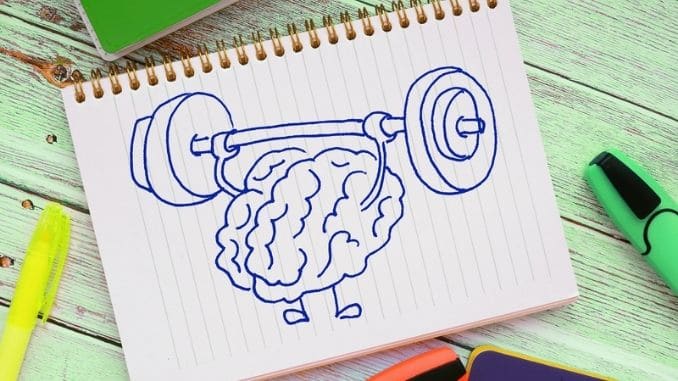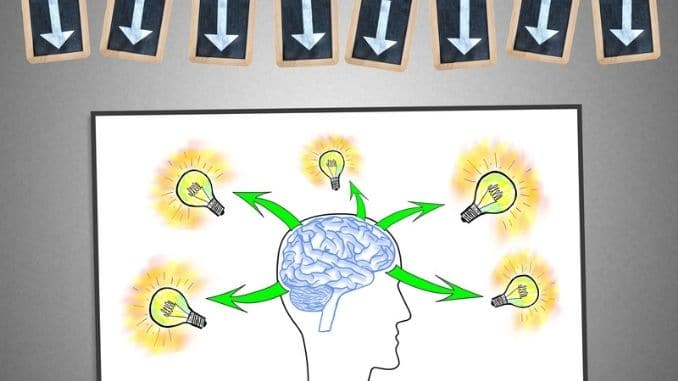
There are few days when having more focus, attention, and brainpower wouldn’t be beneficial. Whether you want to perform better on the job, do better in school, or keep up with your grandkids, scientists have found that the choices you make in your day-to-day life can have a significant impact on how well your brain responds.
Below we have seven easy but tested ways to boost your brainpower, increase your focus, and become even more of a genius than you already are.
1. Exercise every day.
This is one of the best things you can do for your body, but studies have found that it’s highly beneficial for your brain, too.
According to the University of California, San Francisco, “Exercise is one of the best-studied and most powerful ways of protecting the brain from age-related cognitive decline…” In a study of about 450 people, those who moved more over a period of 20 years scored better on memory and thinking tests, with every increase in physical activity by one standard deviation associated with a 31 percent lower risk of dementia.
Exercise isn’t just protective as you age, however. It also has the power to immediately boost your brainpower. In a study done at the University of British Columbia, scientists found that regular aerobic exercise—the kind that gets your heart pumping—appeared to boost the size of the hippocampus, which is the part of the brain involved in verbal memory and learning.
In another study, when teachers added exercise routines to math lessons, math scores improved faster for the exercisers than for those who didn’t exercise during the lesson.
So, no matter what you do, don’t skip your daily walk, run, bike, or other aerobic workouts!
2. Do something new.
Putting yourself in new and challenging situations stimulates your brain, whereas getting stuck in a rut does the opposite.
The key here is to do something that takes you out of your comfort zone. That means learning a completely new skill, such as playing a musical instrument, riding a horse, or making a quilt.
Scientists from the University of Texas at Dallas randomly assigned about 200 people to different activities. Some learned digital photography while others learned to quilt. The groups spent 15 hours a week for three months learning the new skills. They were then given memory tests, which were compared with those of several control groups that engaged in the fun but easy activities like watching movies or listening to the radio.
The results showed that only those people who learned new skills experienced improvements in memory, with the most difficult skills to learn having the greatest benefits.
Learning something new stimulates neurons in the brain to form new neural pathways, allowing electrical signals to travel faster across them. At the same time, the density of myelin, which protects the white matter in the brain, increases. Both of these activities help boost brain function while reducing the risk of dementia later in life.
3. Eat a healthy diet.
Like the heart, liver, and lungs, the brain is an organ and can perform only as well as the nutrients it receives. That means if you eat a healthy diet filled with lots of fruits and vegetables, whole grains, lean proteins, and healthy fats, your brain will perform better and you’ll be less likely to suffer cognitive decline as you age.
In one study involving over 4,000 participants, researchers found that better diet quality was related to larger total brain volume, which suggested that a healthy diet could affect brain structure. Indeed, since we know that the brain tends to shrink as we age, eating a healthy diet may help to offset that unfortunate change.
Multiple studies have found a link between a diet high in refined sugars and impaired brain function—and even a worsening of depression. Studies comparing healthy diets like the Mediterranean diet with the typical Western diet (high in fat, sugar, and salt) have shown that the risk of depression was 25-35 percent lower in those eating the healthier diet.
What’s important is eating a healthy diet overall, but some foods have been specifically linked to brainpower:
- Green, leafy vegetables
- Fatty fish (salmon, tuna, pollack)
- Berries
- Broccoli
- Pumpkin seeds
- Dark chocolate
- Eggs
- Tea and coffee
- Nuts
4. Stay in touch with your friends.
Maintaining strong social connections is good for your long-term health, scientists say, and can be particularly good for your mental health. That means regularly visiting with friends and family, volunteering, and attending classes, or doing other activities that help keep your relationships strong.
Indeed, keeping your social calendar filled is one of the best things you can do for your brain, according to a 2020 study. Researchers examined data about social engagement from nearly 300 participants with an average age of 83 who received a sensitive brain scan that looked at the integrity of brain cells. They found that those who reported greater levels of social engagement had the more robust gray matter in regions of the brain that are relevant in dementia.
Other studies have found that those who are more socially engaged and have larger social networks tend to have a higher level of cognitive function. To increase your social engagement, focus on the relationships and the activities you enjoy the most. Seek opportunities to engage with others, such as taking an in-person class, joining a club in your area, or simply checking in on your neighbors more often. Volunteer to help at a school or community center or start a group of your own that centers around one of your interests.
5. Get some sunlight.
Many of us are spending more time indoors than ever before. This isn’t good for the brain, as it can result in low levels of vitamin D (your skin makes vitamin D when exposed to the sun), and can disrupt your natural body clock. It can also negatively affect your mood.
In one study of nearly 17,000 people aged 45 and older, researchers found an association between decreased exposure to sunlight and an increased probability of cognitive impairment. Researchers have also found that the availability of sunshine has more impact on mood than any other environmental factor.
Getting some sun increases the levels of serotonin, the “good mood” neurotransmitter, in your brain, which not only helps you feel good but can also improve your sleep. When your skin is exposed to the sun, it not only creates vitamin D but releases nitric oxide into your blood, which helps lower blood pressure and improves heart health.
Animal studies have also shown that sunlight can alter mood, behavior, and cognition. So do your best to get outdoors for at least 30 minutes on most days.
6. Meditate.
Scientists have found some pretty amazing things when it comes to meditation’s effect on the brain. Not only does a regular meditation practice reduce age-related brain degeneration and improve cognitive function, but it can also create long-term effects on the brain networks.
In a study in which participants engaged in a 7-day meditation retreat, results showed that the intense experience of meditation increased brain efficiency. Indeed, much research has shown that meditation can thicken key areas of the cortex that help you control your attention and emotions. In a 2014 review, scientists found that meditators’ brains tend to be enlarged in several regions, including those involved in emotional self-awareness, self-regulation, and attention.
Meditation can help reduce stress, too. In a 2016 study, participants suffering from work-related stress were able to reduce it through a three-day meditation intervention.
And if you want to improve your focus and concentration, meditation is one of the best ways you can do that. In a 2013 study, scientists found that it decreased mind wandering and improved cognitive performance—and that was after only two weeks of practice.
7. Sleep well.
A lot of people aren’t getting enough sleep these days. The U. S. Centers for Disease Control and Prevention (CDC) calls sleep deprivation a public health epidemic, noting that a third of U. S. adults report that they usually get less than the recommended amount of sleep (7-8 hours per night).
Regularly failing to get enough sleep can increase your risk of many diseases, including type 2 diabetes, heart disease, obesity, and depression. But it can also impact your cognitive health.
During sleep, the brain performs a nightly clean-up. It reorganizes and recharges itself, and removes toxic waste byproducts that accumulate through the day. Sleeping, therefore, helps clear the brain so it can maintain its normal function. Not getting enough sleep can result in a toxic buildup that can hinder cognitive performance and judgment and increase the risk of dementia down the road.
In a 2007 study, researchers found that chronic sleep loss impairs attention and working memory, while also affecting long-term memory and decision-making. Even one night of bad sleep can affect your attention and concentration. Sleep disturbances are also associated with psychiatric disorders and neurodegenerative diseases.
A 2018 study showed that just one night of sleep deprivation resulted in the accumulation in the brain of a protein implicated in Alzheimer’s disease.
So do everything you can to get 7-8 hours of sleep per night. Good tips include the following:
- Keep your bedroom cool and quiet.
- Make sure you have a quality, comfortable mattress.
- Keep all technological gadgets out of the bedroom, including televisions and cell phones.
- Avoid alcohol and caffeine at least four hours before bed.
- Practice a relaxing routine an hour before bed that includes turning the lights down and engaging in calming activities like reading, journaling, or listening to relaxing music.
In addition to all of the lifestyle suggestions we have made above, there are many different games and apps currently available with a focus on boosting your brainpower. Most of these are free to download and can provide hours of fun while helping promote creative thinking and problem-solving. The old adage that you can’t train an old dog new tricks could not be further from the truth, so invest in your brain health today. Looking for new ways to mentally challenge yourself can help your live your best life for years to come.
If you’re interested in learning even more ways to clear the fog and improve your brain power naturally, click here.









